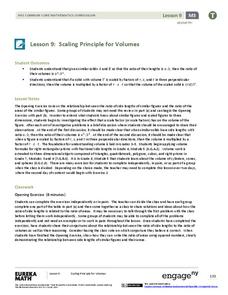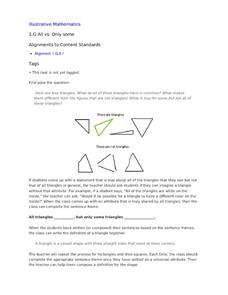EngageNY
Addition and Subtraction Formulas 1
Show budding mathematicans how to find the sine of pi over 12. The third instructional activity in a series of 16 introduces the addition and subtraction formulas for trigonometric functions. Class members derive the formulas using...
EngageNY
Making Scale Drawings Using the Ratio Method
Is that drawn to scale? Capture the artistry of geometry using the ratio method to create dilations. Mathematicians use a center and ratio to create a scaled drawing. They then use a ruler and protractor to verify measurements.
EngageNY
Scaling Principle for Volumes
Review the principles of scaling areas and draws a comparison to scaling volumes with a third dimensional measurement. The exercises continue with what happens to the volume if the dimensions are not multiplied by the same...
Illustrative Mathematics
All vs. Only Some
All shapes have certain defining attributes that set them apart from others. In order to understand this, young mathematicians look at examples and non-examples of triangles, rectangles, and squares, working as a whole class to create...
EngageNY
Conditions on Measurements That Determine a Triangle
Can any three side lengths create a triangle? Your classes tackle this question and more in the 11th instructional activity of the 29-part module. Through modeling with patty paper, individuals discover the relationship between the...
EngageNY
Graphing Solutions to Inequalities
Activate the strengths of your visual learners using an informative instructional activity. In the 15th installment of the series of 28, pupils graph their solutions on number lines to create a visual representation of solutions....
EngageNY
Inequalities
The 13th activity in the 28-part module asks scholars to write linear inequalities from a problem situation. Individuals then solve and interpret their results in the context of the problem.
EngageNY
Generating Equivalent Expressions
Pupils develop expressions to describe the total number of sides on an unknown number of rectangles and triangles. Expressions contain multiplication, addition, and parentheses.
EngageNY
Solving Inequalities
Investigate complex problem situations by applying inequalities. Building from concepts explored in the previous lesson plan, learners read word problems and develop inequalities to represent the situation. They then solve the...
EngageNY
Writing Products as Sums and Sums as Products II
Explain algebraic relationships through an understanding of area and perimeter. Continuing concepts built in the third instructional activity of the series, the fourth installment of 28 asks learners to identify common expressions...
West Contra Costa Unified School District
Fractional Exponents
Wow! Here is a handout packed full of tips and worked-out solutions to supplement instruction on fractional exponents. The lesson introduces and thoroughly explains the Algebra II concept, and closes with a...
Curated OER
Net "Working"
Upper elementary and middle schoolers explore the properties of various polygons. They use video, resource links, and engage in hands-on activities in order to construct geometric nets. This fine plan should lead to increased...
Utah Education Network (UEN)
Simplifying Algebraic Expressions
Sixth and seventh graders explore the concept of simplifying algebraic expressions. They review the order of operations and apply properties to simplify and compare them. The author suggests using a "Boxes Game" as a motivator to get...
Curated OER
You Can't Go Wrong with a Right Triangle 2
Upper graders use the properties of right angle trignonmetry to measure objects such as the school flagpole. They solve real world problems using these properties.
Curated OER
The Right Stuff
Studentsare introduced to the Pythagorean Theorem by exploring right triangles and the squares built on each side. They apply the Pythagorean Theorem to real-world problems. Students u se informal and nonformal arguments of proof (i.e.,...
Pennsylvania Department of Education
The Multiplicative Identity and Numbers Close to One
Pupils practice multiplying and dividing whole numbers by fractions. They study the multiplicative identity property that states that the product of any number and 1 is that number. They multiply whole numbers by fractions close to 1 and...
Illinois State Board of Education
Geoboard Areas
Middle school geometers determine the area of a shape on a geoboard or dot paper and draw figures that meet given area conditions. Working as a class, they develop and discuss various ways to draw geometric shapes with specified...
Curated OER
Sharing Gum
Young mathematicians solve arithmetic and simple algebraic equations using properties of real numbers, equality, and inequality. Justifying the procedures is their next task. They solve a problem involving linear inequality and justify...
Curated OER
A Fibonacci Primer
Upper graders explore the Fibonacci sequence. They examine the characteristics of the Fibonacci sequence, list the properties of the sequence and determine how it connects to Pythagorean Triples. Related thinking questions are included.
Curated OER
Talking About Your Name in Math Terms
Add imagination and creativity to your math lesson plan. Young mathematicians investigate ways to express their names in mathematical terms. For instance, they can count the number of letters, analyze the geometric shapes of the letters,...
Curated OER
Finding Volume
Sixth graders develop a rule for finding the volume of rectangular solids using colored cubes. They investigate the properties of solid figures and find the volume of an object by counting units. Students fill spaces with standard-sized...
Teach Engineering
Exploring the Forces of Tension
Let the resource stretch the minds of your young scientists with a lesson plan about tensile strength and stiffness of materials. Groups consider how easily materials stretch and relate this property to engineering design.
Curated OER
Sorting and Classifying
Fifth graders are engaged in sorting and classifying geometric shapes of various colors and sizes. They discuss the properties of these shapes and illustrate a range of classifications using Venn diagrams.
Illustrative Mathematics
Rectangle Perimeter 3
This activity looks at writing expressions to represent perimeter of a rectangle and then considers the concept of equivalent expressions and the distributive property in more detail.























